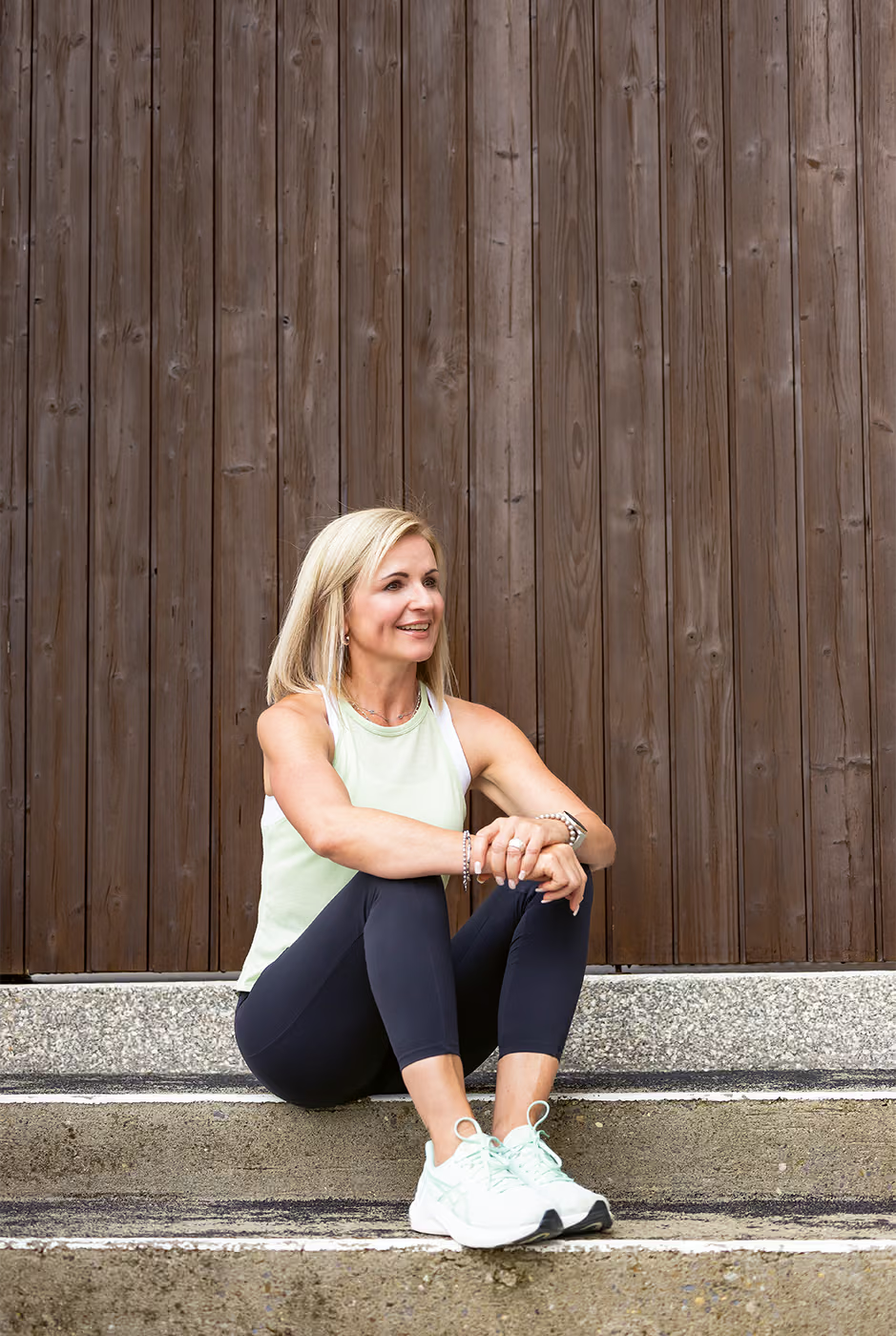Andrea, you joined Otto Hofstetter AG in June 1991. What convinced you sign up back then?
I had completed my apprenticeship at Charles Vögele, a leading Swiss fashion retailer, and wanted to try something new. My mother told me about a job opening at Otto Hofstetter AG. Everyone in Uznach knew the Hofstetters, and I'd known Otto Hofstetter Junior since I was a child. He sometimes helped his wife, Brigitt, who coached the girls' gymnastics team that I belonged to. My mother also used to work as a cleaner at the company. The job description matched my educational profile, so I applied and got the position. It was a stroke of luck.
Going from fashion to mould making must have been a big change.
It was difficult at first. A completely different world. People spoke more directly than in the fashion business, where everything was more refined and reserved. Much of the production work at Otto Hofstetter AG was still done by hand; there were no robots. Nobody dared to even touch the computer. This was the era of the legendary Commodore computers, and we still recorded our working hours with classic paper time cards. Here's a little anecdote: Otto Junior had his office next to mine and it was always dangerous to step in there because he had a dartboard in his office and we never knew if darts were flying!
How big was the company back then?
Much smaller than today, probably fewer than 100 employees. In the back, where the new plat production building now stands, we had a football field where we often played and where we even had some fun tournaments, including us girls. That was a highlight. The design department, with the highly skilled technical draughtspeople at their large tables, sat where the sales department is today. Everything was much more cramped. Mr Hofstetter Senior was still the managing director and Otto Junior was the operations manager. Werni Hofstetter, Otto Senior's brother, was the accountant.
After eight years, you took a maternity leave and then decided to return.
I wasn't even gone a full year. My successor wanted to take an extended trip to Costa Rica and asked me if I would cover for her. My son was only six months old at the time and naturally he was fixated on me. I was offered the opportunity to come to the office whenever I wanted, as long as it suited my responsibilities at home. This generosity and flexibility was also demonstrated in other contexts later on at the company. I think this kind of thing is only possible in a family business like Otto Hofstetter AG.
25 years have passed since you returned. What has changed?
Everything has become much faster paced, on shorter notice and much more technical, sometimes almost too technical, ignoring the importance of personal relationships. But the employees have changed too. It seems to me that people used to be more aware of what a privilege it is to work at Otto Hofstetter AG. Being able to work in such a fair and well-run company isn't something to take for granted these days. Perhaps it's because people used to be more dependent on their salary. Today, some people almost have too much.
What’s remained the same at the company?
The company still has a very family-like atmosphere. Everyone looks after each other. I started during Otto Hofstetter’s Senior’s time and he always had an ear open for his employees. It's the same with Otto Junior. With him, everyone gets a second chance. It only becomes difficult the third time around. The atmosphere among the staff is also friendly today, and everyone knows and greets each other, even though we now have almost 200 people in Uznach.

What moments in your career stand out for you?
My son Timo completed his apprenticeship as a polymechanic at Otto Hofstetter AG. That certainly was a highlight for me. My history with the company spans three generations of the Hofstetter family and that’s also a very special thing. And here’s a funny memory from a company outing, which we used to take regularly: everyone was waiting for the bus to pick us up but it never arrived. When we finally enquired with the driver, it turned out he had been booked for the following day. We all had a good laugh and made the trip the next day.
Are there any other memorable experiences?
For me, it's always a great moment when we open our company to the public or to other interested groups. When I think about where the company's roots lie and that we now operate in 77 countries, I'm filled with pride to be part of the company. And when I think back to the difficult moments – most recently the coronavirus pandemic – I realise that we have overcome some challenging times and always continued to work. In Otto Hofstetter Senior’s time, it was a cardinal rule that before reducing anyone’s working hours, he would find some way to keep us all employed, even cleaning the roof together, for example.
What does your daily routine look like?
You could call me a “jack of all trades”, a role that I love. My responsibilities are very varied and range from time tracking and accounts payable management to travel visas for salespeople and service technicians so that they're always ready to work if needed. I also record production data, and in general if any kind of urgent situation develops, I’m ready to jump in and help out, if I have time.
What are you particularly passionate about in your work?
I always make time for the company and especially for the apprentices. I'm like their House Mother and I really enjoy this role. Sometimes it's good for young people to get input from a neutral person. They know they can always turn to me – no matter what.
In your opinion, what’s the basis for Otto Hofstetter AG’s global success?
I think it’s a combination of things: first the quality of our products, the many innovations we’ve introduced, the independence that comes from being a family-owned business, the character of both Otto Hofstetters, Senior and Junior, and the company’s Swissness, by which I mean its emphasis on quality and customer satisfaction. Innovation is driven by our customers’ needs. And we don’t shy away from challenges. For example, when the decades-long partnership with Netstal began to dissolve, Otto Systems was born. Perhaps our motto should be the old saying: if life gives you lemons, make lemonade!
How would you define the company’s culture?
For one thing, in my experience, Otto Hofstetter AG would never abandon anyone who finds themselves in a difficult situation. This applies to customers and partners as well as to its employees. I am convinced that each individual employee makes an important contribution to the success of our company – regardless of their specific job. I seem to share this conviction with the management team. I also find our approach of taking time to learn about other points of view or the background that led to a specific decision or action is also a positive.
You are very athletic and run long distances. What drew you to this demanding hobby?
It started when I was ten or twelve years old. Today, you might say I was a child with ADHD, and running was my outlet. It's still like that today. If I’m worried about something, I go for a run for an hour. Afterwards, I usually find a new, more positive perspective. I also run because I want to stay healthy as I get older.
What running experience stands out in your memory?
I once saw a crime story about a runner who was attacked in the woods. When I went jogging the next morning, those images were still in my head. And suddenly, a man jumped out of the trees right in front of me. I screamed so loudly that he dropped the stick that he was holding. He was just a harmless mushroom picker. A completely different story has to do with a half marathon I signed up for. I was determined to run the course in 1:45, and I managed to do it. That showed me that if you really want to achieve something, you can.
What does nature mean for you?
Nature and fresh air are my sources of peace, reflection and clarity of mind. I love being outdoors. I usually go jogging or cycling alone. Even when my husband or daughter is with me, we don't talk much. If I see a deer, I consider it an emissary from heaven. When a butterfly flies by, I feel like one of my deceased loved ones is beside me. Nature means a lot to me.
What challenges do are coming your way in your job?
Our working lives will probably become ever more technical and digital. We may well also encounter programs that use AI in the areas of production figures and accounting. So, I hope I don't miss the boat and can continue to contribute to the company’s success. One task I set for myself is to convey to my trainees that they should passionate about the company and aware of their role as an ambassador for it.
How do you envision the company in ten years?
Ten years is a long time these days. It's really hard to imagine how things will look that far out into the future. But I believe we have every reason to be optimistic. I would be grateful if some things remain as they are on an interpersonal level. If there was still room for a joke or a chat after work. I think a feeling of togetherness, of being part of a team with a shared goal, will continue to be vital for the company’s success.











